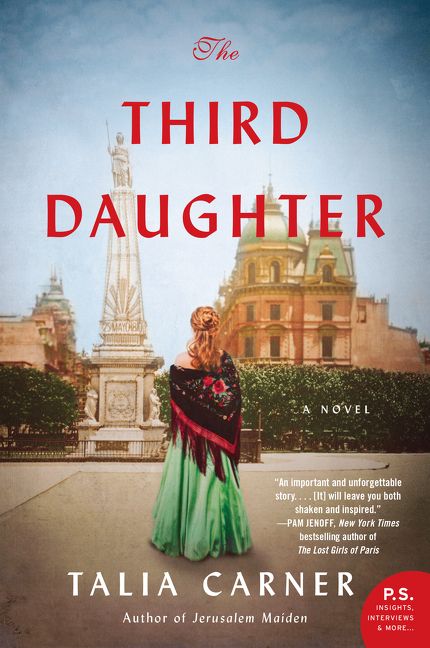
• Paperback: 432 pages
• Publisher: William Morrow Paperbacks (September 3, 2019)
“In The Third Daughter, Talia Carner ably illuminates a little-known piece of history: the sex trafficking of young women from Russia to South America in the late 19th century. Thoroughly researched and vividly rendered, this is an important and unforgettable story of exploitation and empowerment that will leave you both shaken and inspired.” —Pam Jenoff, New York Times bestselling author of The Lost Girls of Paris
The turn of the 20th century finds fourteen-year-old Batya in the Russian countryside, fleeing with her family endless pogroms. Desperate, her father leaps at the opportunity to marry Batya to a worldly, wealthy stranger who can guarantee his daughter an easy life and passage to America.
Feeling like a princess in a fairytale, Batya leaves her old life behind as she is whisked away to a new world. But soon she discovers that she’s entered a waking nightmare. Her new “husband” does indeed bring her to America: Buenos Aires, a vibrant, growing city in which prostitution is not only legal but deeply embedded in the culture. And now Batya is one of thousands of women tricked and sold into a brothel.
As the years pass, Batya forms deep bonds with her “sisters” in the house as well as some men who are both kind and cruel. Through it all, she holds onto one dream: to bring her family to America, where they will be safe from the anti-Semitism that plagues Russia. Just as Batya is becoming a known tango dancer, she gets an unexpected but dangerous opportunity—to help bring down the criminal network that has enslaved so many young women and has been instrumental in developing Buenos Aires into a major metropolis.
A powerful story of finding courage in the face of danger, and hope in the face of despair, The Third Daughter brings to life a dark period of Jewish history and gives a voice to victims whose truth deserves to finally be told.
Purchase Links
HarperCollins | Amazon | Barnes & Noble
Review:
Batya and her family flee their hometown in the Russian countryside, the only survivors of another pogrom. After pushing their belongings through the countryside and living off the kindness of others, a wealthy foreign Jewish man, Reb Moskowitz enters the family's life and takes an interest in 14 year-old Batya. Moskowitz offers Batya's father money for her betrothal to him and promises her plenty of food, a nice home and a fortune in America. However, Batya quickly learns that Moskowitz is not the good man he portrays. Batya is sold into prostitution in Buenos Aires, Argentina. After being abused, locked up, tortured and starved, Batya comes to terms with her predicament and focuses on survival. She becomes a sought out girl in her brothel and is trusted by Moskowitz. Batya's hopes are focused on bringing her family over from Russia and a mysterious new client may help Batya escape slavery and saver her family.
I absolutely adore historical fiction that is able to open my eyes to a period of history that I knew nothing about. I was certainly not aware of the very long time span that prostitution was legal in Argentina and fueled by the Zwi Migdal, a ring of Jewish men and women who kidnapped young girls and widows for their own profit. The writing deftly portrays the horror as well as the hope in Batya's story. It was obvious that the author delved into the research of this hidden history, from the way Batya was lured away from her family, to the conditions on her journey to Argentina and how she was treated in the brothel to the rhythms, dances and food in Buenos Aires, everything was reflective of the experience of the women and the time period. I was very interested in how involved the Zwi Migdal was in Argentinian politics and culture and just how hard it was to bring them down. I was amazed at Batya's bravery helping to provide evidence against Moskowitz in kidnapping women and especially the real woman, Raquel Liberman who risked it all to save other women from her fate.
This book was received for free in return for and honest review.








 RSS Feed
RSS Feed



